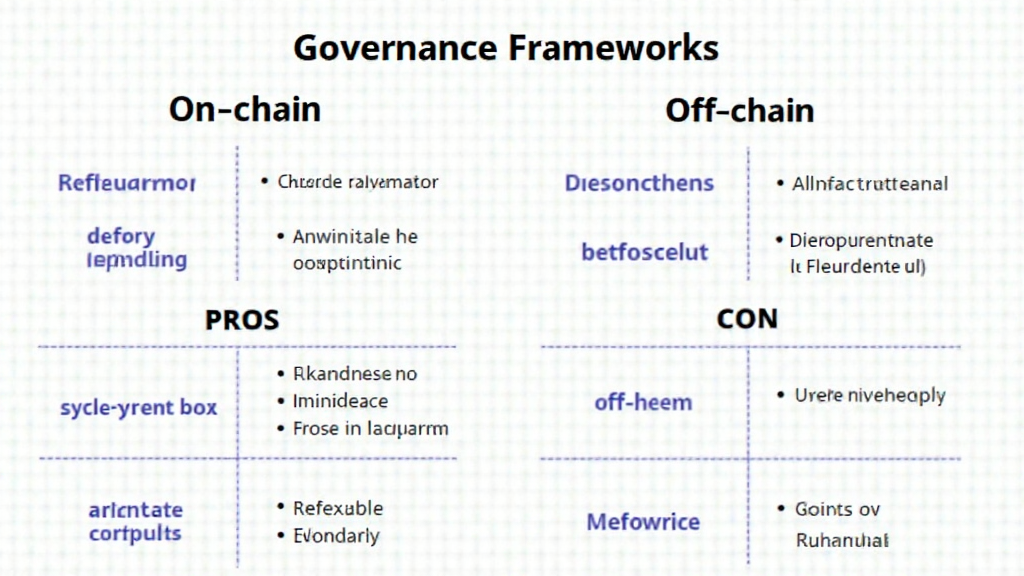Cryptocurrency Governance Frameworks: The Future of Digital Decision-Making
With $4.1 billion lost to DeFi hacks in 2024, the cryptocurrency landscape is more vulnerable than ever. As the market matures, the need for robust governance frameworks in cryptocurrency is increasingly evident. These frameworks not only aim to secure digital assets but also ensure transparency, accountability, and democratic participation in decision-making processes. Understanding these governance structures is critical for anyone involved in the crypto space.
What Are Cryptocurrency Governance Frameworks?
At its core, a governance framework outlines how decisions are made within a cryptocurrency ecosystem. This can range from protocol upgrades to fund allocation and dispute resolution. Here’s a breakdown of the different elements involved:
- Consensus Mechanisms: The rules by which transactions are verified and added to the blockchain are crucial.
- Voting Rights: Holders of tokens often participate in governance by voting on key issues.
- Transparency and Accountability: Clear processes are required to ensure that all parties are held accountable.
Types of Governance Frameworks
Governance frameworks can be broadly categorized into two types: on-chain and off-chain governance.

On-Chain Governance
This model allows token holders to vote directly on protocol changes using smart contracts. One prominent example is Tezos, which enables stakeholders to propose and vote on amendments to the protocol.
- Pros:
- Direct participation from the community.
- Seamless implementation of changes.
- Cons:
- Potential for low voter turnout.
- Centralization risks if a few holders own a large number of tokens.
Off-Chain Governance
Unlike on-chain governance, off-chain governance takes place outside the blockchain through community discussions, forums, and other platforms. Bitcoin serves as a classic example, where discussions occur on platforms like Bitcoin Talk, leading to community-wide consensus before any changes are made.
- Pros:
- No gas fees associated with voting.
- Opportunity for in-depth discourse.
- Cons:
- Possibility of factionalism.
- Slower decision-making process.
Importance of Governance in Cryptocurrency
The significance of cryptocurrency governance frameworks cannot be overstated:
- Security: Well-defined governance structures can prevent malicious attacks.
- Investor Confidence: Robust governance promotes trust among investors and users.
- Adaptability: As technology evolves, governance frameworks can adapt to meet new challenges.
Challenges in Implementing Governance Frameworks
Despite their importance, creating effective governance frameworks comes with its own set of challenges:
- Token Distribution: Uneven distribution can lead to centralized power dynamics.
- Voter Apathy: Low participation rates can invalidate governance decisions.
- Communication Gaps: Miscommunication about proposals can lead to community discord.
Case Studies of Successful Governance Frameworks
Let’s explore some successful examples of governance frameworks within various cryptocurrency projects:
DAOs and Their Impact
Decentralized Autonomous Organizations (DAOs) represent the ultimate form of distributed governance. One prominent example is MakerDAO, which governs the DAI stablecoin. Here’s how it works:
- Token holders vote on key decisions affecting the stability of DAI.
- Transparency is maintained through on-chain voting and proposals.
MakerDAO’s governance structure has led to stable growth and adoption of DAI in the DeFi space.
The Role of Community
For many cryptocurrency projects, community involvement is a cornerstone of effective governance. Ethereum thrives on community feedback and developer input. Ethereum Improvement Proposals (EIPs) provide a structured way for community members to suggest changes.
Trends Shaping the Future of Cryptocurrency Governance
As the cryptocurrency space evolves, so too will its governance structures. Here are some trends to watch:
- Increased Regulation: Governments are beginning to impose regulations that may require stricter governance protocols.
- Hybrid Models: A blend of on-chain and off-chain governance is becoming popular among new projects.
- Focus on Accessibility: More platforms are striving to make governance tools user-friendly for everyday investors.
Cryptocurrency Governance in Vietnam
Vietnam’s crypto market is rapidly growing, with the user growth rate increasing by 25% in 2023 according to local reports. As more Vietnamese engage with cryptocurrencies, understanding governance frameworks becomes crucial. Tiêu chuẩn an ninh blockchain is essential for ensuring that local projects are safe and reliable.
Conclusion: The Path Forward
In summary, cryptocurrency governance frameworks play a pivotal role in ensuring the future of digital assets. As the landscape becomes increasingly complex, stakeholders must navigate these frameworks to foster security, transparency, and inclusivity. As more investors enter the market, especially in regions like Vietnam, the demand for efficient and transparent governance structures will only grow. Stay informed and involved to help shape the future of this exciting industry.
For more insights and updates, be sure to visit officialcryptonews.
About the Author
Dr. Alex Thompson is a blockchain researcher and expert, with over 15 publications in the field of cryptocurrency governance. He has led audits for multiple well-known projects and consults on best practices for digital asset governance.




